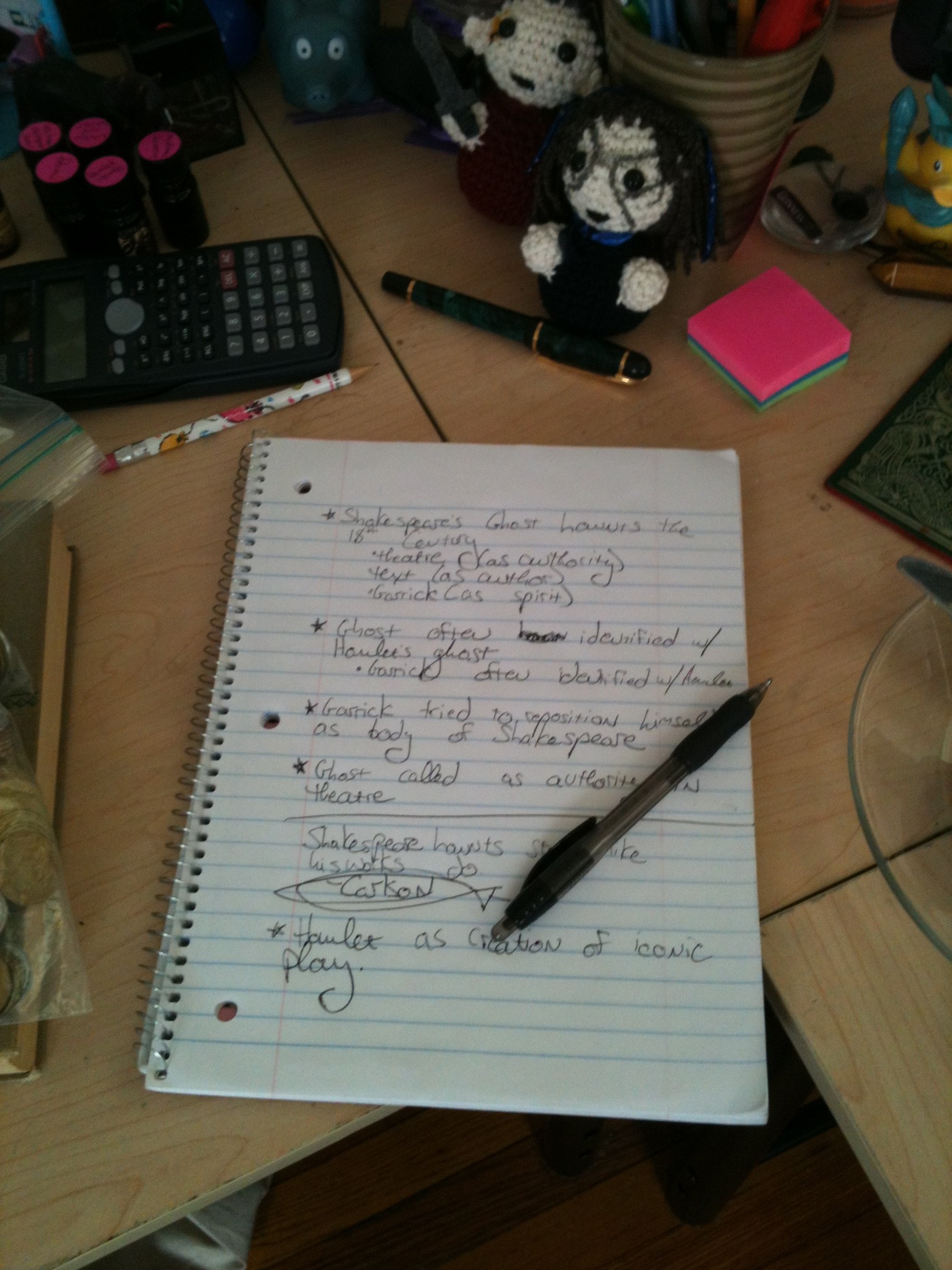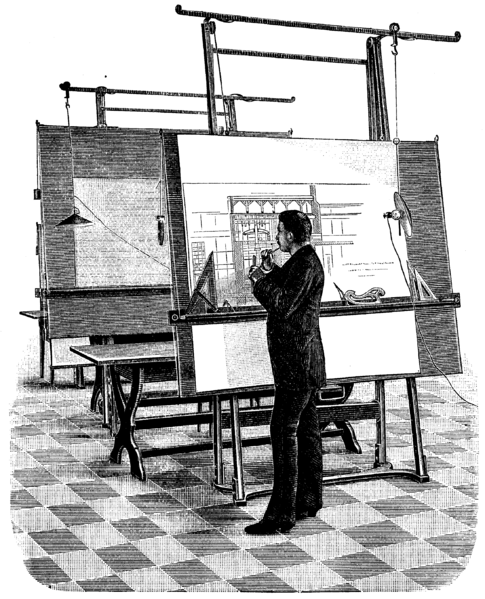As you, dear reader, have seen from my previous posts, it is, as they say, “go time”.
This semester, I have a unique conundrum.
I am a meticulous researcher and a slow writer. This is good for some things, but not for others.
In certain fields, it’s very easy to get bogged down by what everyone else has said before. There is so much writing on Shakespeare already that finding a place for one’s own voice can be extremely difficult. In this regard, the fact that I do spend so much time in the research phase means that it’s even easier for me to fall into the chasm of academic apathy: “Why bother saying anything when everything’s already been said?! Why do I even exist?”. It also means that it’s extremely exciting when I do come upon something within my own mind that has not been said before (“YAY! I’m smarter and more creative than a whole giant field of scholarship!” Disclaimer: not really true, it’s easy to get carried away sometimes).
Sometimes I go into the research process with an idea already formulating. Sometimes I just go into it with a general topic in the hopes that something will spark.
This semester (for one of my papers at least), I’ve been on a long and winding road of type two. I’m working on a project involving eighteenth century depictions of Shakespeare’s ghost onstage and, surprise surprise, there’s a WHOLE LOT out there.
So how do you go from “What have I done?” to “Look what I did!”? Well, let me give you a sneak peak of my process.
I’ve already written about the process which I follow to create a paper. But what if, as happened to me just this week, you hit a snag? What if you have all of your research together, piled neatly into little segments by theme, but no clue as to what it says? What if you are on a deadline and have to turn in an abstract re: what this paper is going to be about before you yourself even know? What if you simply can’t understand how the heck you’re supposed to fit your voice into this mammoth discourse already in progress, but you don’t have time to start over, and the thought of re-hitting the books is simply making you cry?
Don’t despair. Yet. Try a few of these things (they worked for me eventually).
*Take out a piece of paper and physically write down (not type, WRITE) everything

My writing-it-down led to something... as you can tell by my enthusiastic circling. Also: my desk ornaments.
you know about the topic which you have chosen to research. What are the big ideas? How do they relate to each other? Where are the holes in this web? This act in and of itself may spark something. Writing things down and thinking about them in terms of the big picture loosens up the information in your head. It gets your synapses firing in a meta way and forces you to draw connections which you may have already known, but hadn’t quite understood yet. It also demonstrates very graphically where the lapses in information are and those places are places for you to do some work. Fill in those gaps with your own thinking! Write and publish, people, so that students in the future will have to contend with your work as a roadblock.
*Don’t forget step three. The shower is the most important part of my creative process. And really, who couldn’t use more showers in her life?
*Re-read your source material. Now that you’ve done the research around it, turn back to the piece that originally inspired you (be it play or novel). Chances are, you will spot all the things that the other people have spotted, but you may also spot something new, different, and exciting. And really, you started this project because you were inspired by this piece, why shouldn’t it inspire you again?
*Go back to your theory. You haven’t just been reading it for your health. A straightforward, theory-driven reading is often times too simplistic for a graduate-level paper, but integrating theory is another great way to get you thinking about something differently. Applying theory can help you to arrive at some new conclusion, something you hadn’t seen before. Most importantly: theory is the building blocks of an argument. You can bat around theory, there are plenty of spaces for interpretation, and theory is universal and applicable almost anywhere. Get canny with your Kant, formative with your Foucault, dexterous with your Derrida, and brilliant with your Bakhtin!
*If none of these things work, and you still feel buried and struggling, contact your professor. She is a pro. She’s been doing this a lot longer than you have. If you have your research in order, if you are on top of your writing schedule, there is nothing to be ashamed of. Floundering happens to EVERYONE and your professor has also, in her time, floundered. She will have tips and tricks to help you. She will understand the discourses you are dealing with. She will likely also have a few ideas about your project that can help to unstick you. Trust in her experience, trust in your ability to articulate your own work eloquently, and turn to your mentors for support. That’s why they’re there, after all.
And if all else fails, just remember the sage words of the good Doctor (no, not THAT

not THAT Doctor
Doctor…):
You won’t lag behind,
because you’ll have the speed.
You’ll pass the whole gang
and you’ll soon take the lead.
Wherever you fly, you’ll be best of the best.
Wherever you go, you will top all the rest.
Except when you don’t.
Because, sometimes, you won’t.
I’m sorry to say so
but, sadly, it’s true
that Bang-ups
and Hang-ups
can happen to you.
You can get all hung up
in a prickle-ly perch.
And your gang will fly on.
You’ll be left in a Lurch.
You’ll come down from the Lurch
with an unpleasant bump.
And the chances are, then,
that you’ll be in a Slump.
And when you’re in a Slump,
you’re not in for much fun.
Un-slumping yourself
is not easily done.
You will come to a place where the streets are not marked.
Some windows are lighted. But mostly they’re darked.
A place you could sprain both your elbow and chin!
Do you dare to stay out? Do you dare to go in?
How much can you lose? How much can you win?
And IF you go in, should you turn left or right…
or right-and-three-quarters? Or, maybe, not quite?
Or go around back and sneak in from behind?
Simple it’s not, I’m afraid you will find,
for a mind-maker-upper to make up his mind.
You can get so confused
that you’ll start in to race
down long wiggled roads at a break-necking pace
and grind on for miles cross weirdish wild space,
headed, I fear, toward a most useless place.
The Waiting Place…
…for people just waiting.
Waiting for a train to go
or a bus to come,
or a plane to go
or the mail to come,
or the rain to go
or the phone to ring,
or the snow to snow
or the waiting around for a Yes or No
or waiting for their hair to grow.
Everyone is just waiting.

THIS Doctor
Waiting for the fish to bite
or waiting for the wind to fly a kite
or waiting around for Friday night
or waiting, perhaps, for their Uncle Jake
or a pot to boil, or a Better Break
or a string of pearls, or a pair of pants
or a wig with curls, or Another Chance.
Everyone is just waiting.
NO! That’s not for you!
Somehow you’ll escape
all that waiting and staying
You’ll find the bright places
where Boom Bands are playing.
So go! Off with you! Find those boom bands and make those papers sing!
…I’m off to take a shower.


 The worst part is that idea conception is probably one of my favorite bits about academia. The creative spark is something that, as an artist, I’m always excited about. There’s nothing quite like that moment when the lightbulb flicks on and a single idea snowballs into something feasible, even more interesting than you had initially thought, and something which you’re excited to share with the world at large (or at least your colleagues… or at the very least your professor). I’ve been fascinated in recent years by the idea of structured creativity; the sort of artistry that an academic can bring to one’s work.
The worst part is that idea conception is probably one of my favorite bits about academia. The creative spark is something that, as an artist, I’m always excited about. There’s nothing quite like that moment when the lightbulb flicks on and a single idea snowballs into something feasible, even more interesting than you had initially thought, and something which you’re excited to share with the world at large (or at least your colleagues… or at the very least your professor). I’ve been fascinated in recent years by the idea of structured creativity; the sort of artistry that an academic can bring to one’s work.
